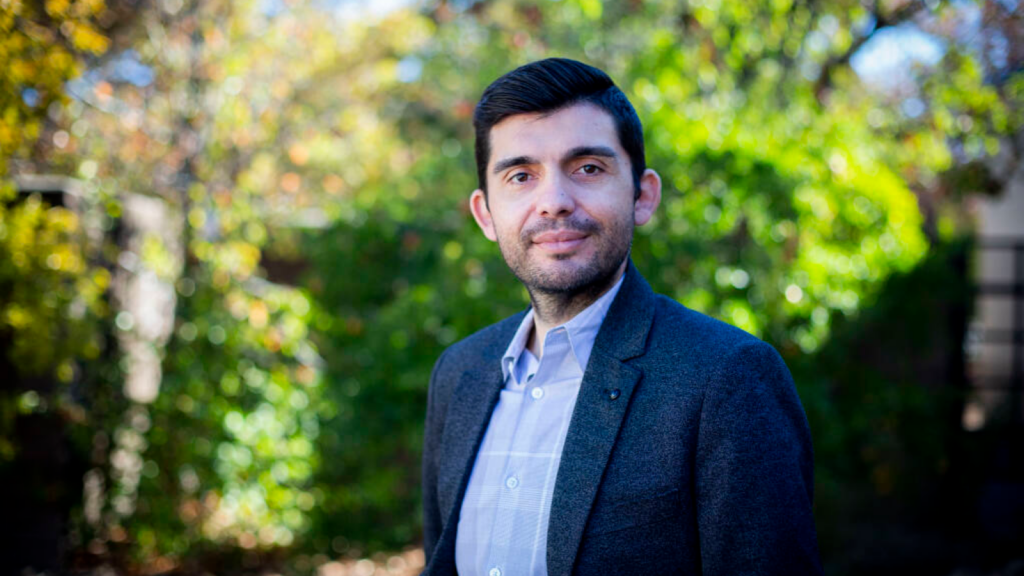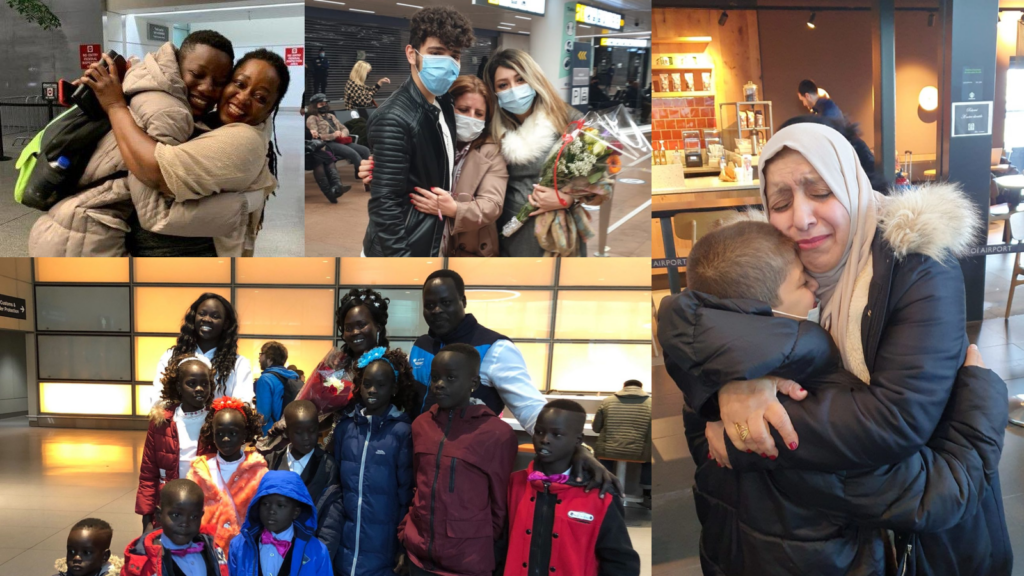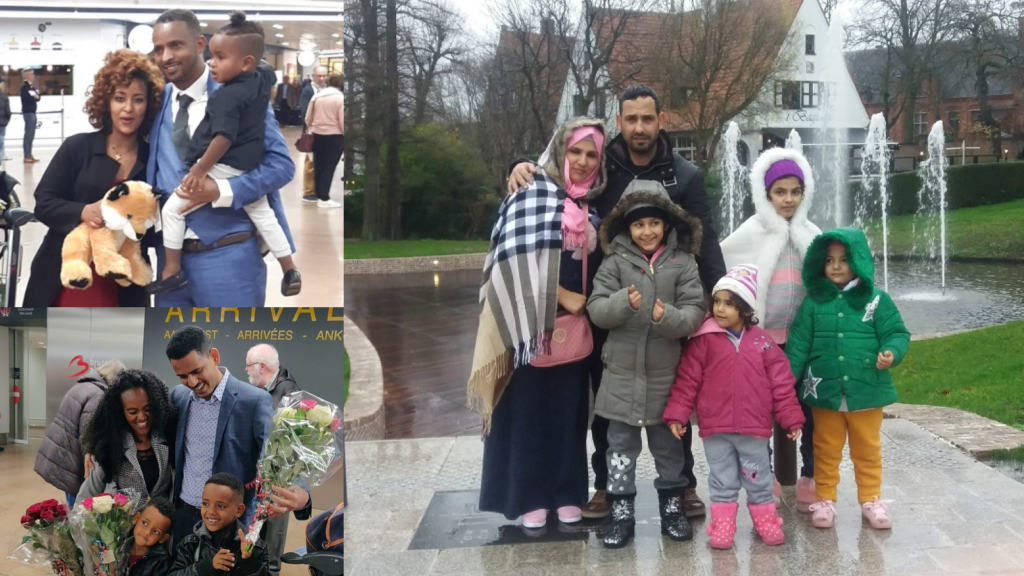Some call it the North Korea of Africa. Facing dire economic conditions, a brutal totalitarian government and compulsory military conscription in Eritrea, tens of thousands of Eritreans have fled their country. For some, the exodus across the border into Sudan or Ethiopia has meant jumping from the frying pan into the fire.
Dehab was lucky. When she fled Eritrea seven years ago and made the harrowing journey to Europe, she eventually received asylum and then refugee status in Belgium. But she was forced to leave behind her son Euel, then 3 years old.
“For all these years, I was counting the days to be reunited with him,” says Dehab. When her son finally received his family reunification visa, after two years of more delays due to the pandemic, the war in Ethiopia’s Tigray region and DNA testing requirements, the only barrier left was the cost of the flight.
Enter Miles4Migrants, a small U.S.-based nonprofit that uses donated frequent flyer miles, credit card points and cash to fly refugees, asylees and their family members to safety. Seven years after its launch, the organization has flown more than 43,000 individuals from 100 countries to safety, using more than 731 million donated miles on flights worth more than $12 million.
Seven years after its launch, the organization has flown more than 43,000 individuals from 100 countries to safety, using more than 731 million donated miles on flights worth more than $12 million.
“I was so happy to hear that Miles4Migrants could help me with a plane ticket for my son,” says Dehab, who was reunited with Euel last year. “Now we are finally together, and I cannot explain how happy we are to be reunited.”
But today, the nonprofit, its mission and its unique model all hang in the balance. Executive director Glaydon de Freitas sat down with Analyst News to explain how Miles4Migrants fills a crucial gap in the global refugee resettlement system and discuss what’s at stake with the organization’s looming closure. This interview has been edited lightly for length and clarity.

How does Mile4Migrants fit into the refugee resettlement space?
Miles4Migrants is a humanitarian aid organization guided by human rights principles. We focus on Article 14 of the Universal Declaration of Human Rights, that everybody has the right to seek refuge. A lot of resources, intention and work has been deployed on how to resettle refugees in the host country, how to reunite families, how to make sure that our host countries are prepared to receive other people from different backgrounds and cultures.
But if we don’t help a person leave their origin country and flee persecution, they will never be able to seek refuge in another country. The first part of the journey of someone who’s facing persecution isn’t being taken care of — unless there is an evacuation, which is deployed every now and then depending on the crisis and the media coverage. So Miles4Migrants was born with that mission: to remove transportation barriers for forced migration.
What impact have you had since your founding?
Our operating model is very simple, and nobody in the world is doing what we’re doing. We ask people from all over the world to take a look at their credit card rewards points, or whatever loyalty program they are with airlines, and we ask: What are you doing with that? Do you have some spare or some miles that you don’t use? Can you give these miles to us so we can remove transportation barriers and change migrants’ lives?
It started seven years ago with our co-founder Nick Ruiz posting on Reddit about using his own miles to fly a persecuted family from Pakistan to Italy. And he then replicated that in a grassroots movement through Reddit communities. By now, we have been able to use this very same model to transport more than 43,000 people to more than 70 countries. In terms of costs, we’ve alleviated more than $17 million that the refugees would have needed to pay out of their own pocket to seek refuge.
We’ve alleviated more than $17 million that the refugees would have needed to pay out of their own pocket to seek refuge.
It’s not just the points and the money that we were able to raise, but also the partnerships that we were able to forge. Without the collaboration of international agencies like the United Nations High Commissioner for Refugees (UNHCR) and the International Organization for Migration (IOM), small nonprofits that are working on the ground with refugees, and also the infrastructure of the United Airlines, Air Canada, Alaska Airlines and all these airline partnerships that made that number possible, we would never have been able to do this.
It’s been exciting to watch your organization move from an entirely grassroots model, built on Reddit of all things, to a global nonprofit with this infrastructure in place and official partnerships with major NGOs. How do you enable one another’s work?
We are a global organization. Our impact is huge. International nonprofits like the UNHCR know us and count on us for a long time. But there’s an assumption people make that we are a huge organization with so much infrastructure. No, we continue to be very small. Our budget is $1.3 million. That’s what our operations cost. Our staff of 11 people makes this happen; we are scalable to fly 10,000 people with the staff that we currently have. We keep it small, because we want to dedicate everything that we raise to the flights.
It’s about capacity building since the beginning, for the international and local NGOs as well as the airlines. Because we developed this nerdy way to book flights in the most cost-efficient way, we’re situated in the middle of these conversations and so we were able to convene all the stakeholders.
To trace the logic of the model: We depend on the NGOs, big and small, because the NGOs are the ones who have the vetting systems and the understanding of the local issues. They know who needs the most, who has access to other existing resources, who can count on family, who is sick, who is the priority, who’s the emergency. We don’t do this triage, we just work with the principle of most vulnerability. We seek partners who are helping the most vulnerable forced migrants — women with children, women alone, the elderly. The NGOs interact with these individuals and submit the flight requests to us.

When we receive the request, we go to our bank account, and that’s where our airline partnerships become important. Points and miles are not a currency, they are a commodity more like a stock market. So we receive donations of American Airlines points, Delta points, United points. Then we receive that request from an NGO in, say, Pakistan. We’re going to say, “OK, what airlines fly from Pakistan to Belgium or to the United States? OK, the best route is this one through Air France. OK, do we have the commodities to pay for that? OK, yes we do, but what kind of partnership do we have with that airline?”
Our partnerships with airlines mean that instead of collecting individual donations, we can have a single account where all donations can be pooled. Let’s say you have 2,000 unused MileagePlus points from United. You can’t actually use that amount to pay for a flight; it’s too low. But when a few people transfer smaller amounts to Miles4Migrants, we can accumulate 10,000 in our pooled account — and then we have enough to fly someone.
If you’re with another airline that doesn’t let us pool donated points, like American Airlines, then each donor needs to give at least 15,000, because that’s pretty much the minimum needed for a flight on American. It also means that we may need to have you, the donor, make the booking from your own account, so it makes our costs a lot higher. These are the calculations that determine how cost-efficient we are, and these are the partnerships that are core essential to our survival.
Your most recent fundraising email mentions that the organization is at risk of shutting down if it doesn’t receive $300,000 in the next three months. Are you able to talk about the shortfall?
We have only been able to bring in cash and miles on a big scale when large crises happen: the fall of Kabul, the family separation at the U.S.-Mexico border, the Ukraine war. That’s when we were able to bring miles in cash to sustain our operations. Our operations are very cheap, but we are surviving only with the money that we are able to raise right from these crises. So Miles4Migrants has not been receiving sufficient cash — not miles, where we always keep a good flow — but sufficient cash to pay ourselves. We are a small team, so we are at risk and on the verge of closing. This is true.
We have in our bank accounts a little bit more than three, four months of months of existence, if it continues like that.
Even with this fundraising campaign, it’s still very true; we’ve only raised about $17,000. It’s not even a week of our operations. We have in our bank accounts a little bit more than three, four months of months of existence, if it continues like that. We have the bookers, we have software, we have computers, we have relationships we’re building, we have platforms. Those digital tools are expensive, and we have our salaries, too.
It’s cheap for a nonprofit, but we are not successful in bringing funds. Why? We believe it’s because we’re a digital organization, so we do not have a local community. The impact that we have is so spread out all over the world, so we didn’t create a community of interest. That’s the nature of our work. But the result is that if we don’t bring cash, this model is going to die.
What’s at stake? What will be lost in the worldwide effort to help people facing persecution if Miles4Migrants is forced to dissolve?
We have more than 100 million refugees in the world right now, and even more internally displaced people. If Miles4Migrants doesn’t continue to exist, we won’t have the chance to show everybody that this model is possible. You don’t need to build any bridges, you don’t need to build any infrastructure, just donate your miles and we’re going to fly people.
That’s what the general public doesn’t understand. Refugees, with a plane or without a plane, are going to use whatever means they have to flee persecution. Because it’s about survival. With this model, we can avoid the passages in the Mediterranean Sea that we see every day. We can reduce the impact of these crossings of Central and Latin American people crossing the desert to the U.S. through Mexico. We could avoid these inhumane and undignifying routes.
Refugees, with a plane or without a plane, are going to use whatever means they have to flee persecution. Because it’s about survival. With this model, we can avoid the passages in the Mediterranean Sea that we see everyday.
Using this model, we can also help the agencies minimize the cost to refugees. Many people don’t know this, but when you receive refugee status, if you don’t have the money to fly to the host country, IOM can open a line of credit for you. They’ll pay for your flights, but you need to pay them back. It’s a loan. We can reduce this burden and allow people to start fresh, with no debt, so they can look for jobs and use their funds to rebuild their lives rather than paying back an international organization.
So we can avoid the danger. We can dignify the travel. We can help the refugees in their new life, which has so many other hurdles and worries. And we can make sure they don’t lose their refugee status, because this status expires, and get stuck in a refugee camp. I think all the difficulties that can exist in a journey are there for refugees to face. And we can avoid those things with our model.

And the problem of refugees and internally displaced people is not going away. Your organization focuses on persecuted people, but we’re already starting to see the emergence of climate refugees, too, for example.
Yes, we use the term persecution because that’s the most common population that we fly, and the language is based on the refugee conventions. Our mission is around forced migration. The way that we understand forced migration is, in accordance with international law, around war and armed conflict. The second one is persecution; a refugee is someone who is afraid to stay in or go back to their home country because they’ve faced or will face persecution on the basis of their race, religion, nationality, political opinion or because they’re a member of a particular social group.
Then we have the third component, and that’s about natural disasters. That includes earthquakes, as well as environmental crises that are being maximized by global climate change. We’re also engaged in discussions about other conflicts that will be created among nations due to these conditions, and we can anticipate that because of lack of resources. Let’s say the lithium war — is that going to happen? Because Africa and South America have the largest reserves, who is going to try to colonize, or recolonize to lead in this industry? Is that going to create internal conflict, civil wars, multi-state wars? We need to be ready for forced migration that will arise because of climate change.
Is there anything else that people misunderstand about the work that you’re doing?
When we talk about human rights, it’s not charity. We’re not here to do charity. We are here because we decided, as a human race, that we co-share the responsibility to guarantee not only our human rights, but everybody’s human rights. If we are here in the United States and we do not have these specific human rights being violated while others have, this is still going to impact us negatively. That’s why we need to share the responsibility of deploying resources to help these communities and these people who do not have the privilege to plan ahead, to have aspirations and goals and dreams, because political incidents are preventing them from living their lives.
If we do not add this responsibility to our own plate, we are not being good world citizens. It’s my responsibility, but it’s also your responsibility to uphold that with us. And your small donations matter. Grassroots fundraising matter.
“People are dying, how can I help? I only have 10 bucks to donate!” Well, that’s what we’re looking for. We cannot count on corporations to give us big gifts. When we receive X amount of miles to fund a flight from South Sudan to the United States, we do have the points, but we do not have the $100 of cash for the fees and the taxes. So if you give $10 or $20, it will help us cover the fees for the flights, too. Literally every donation helps. We need people to know that they can help with the minimum. We transform this minimum donation into the maximum impact, always.
Donate cash or airline miles to Miles4Migrants here.

